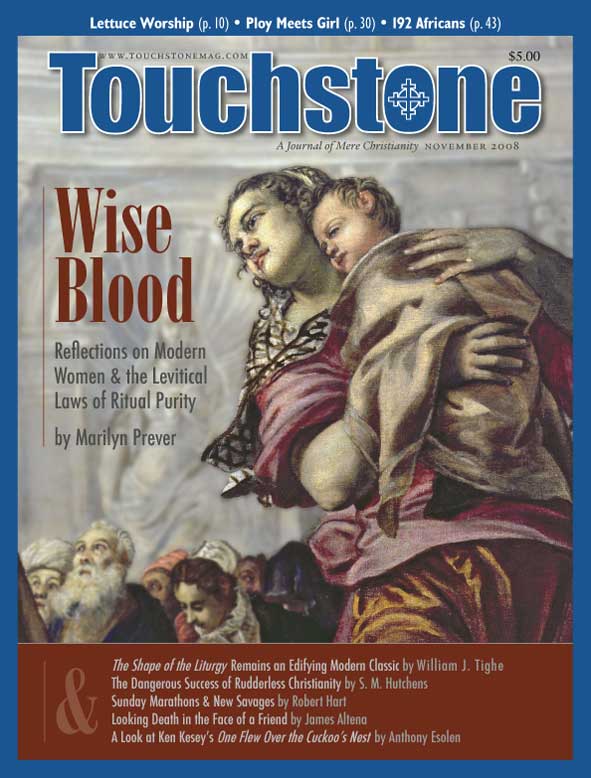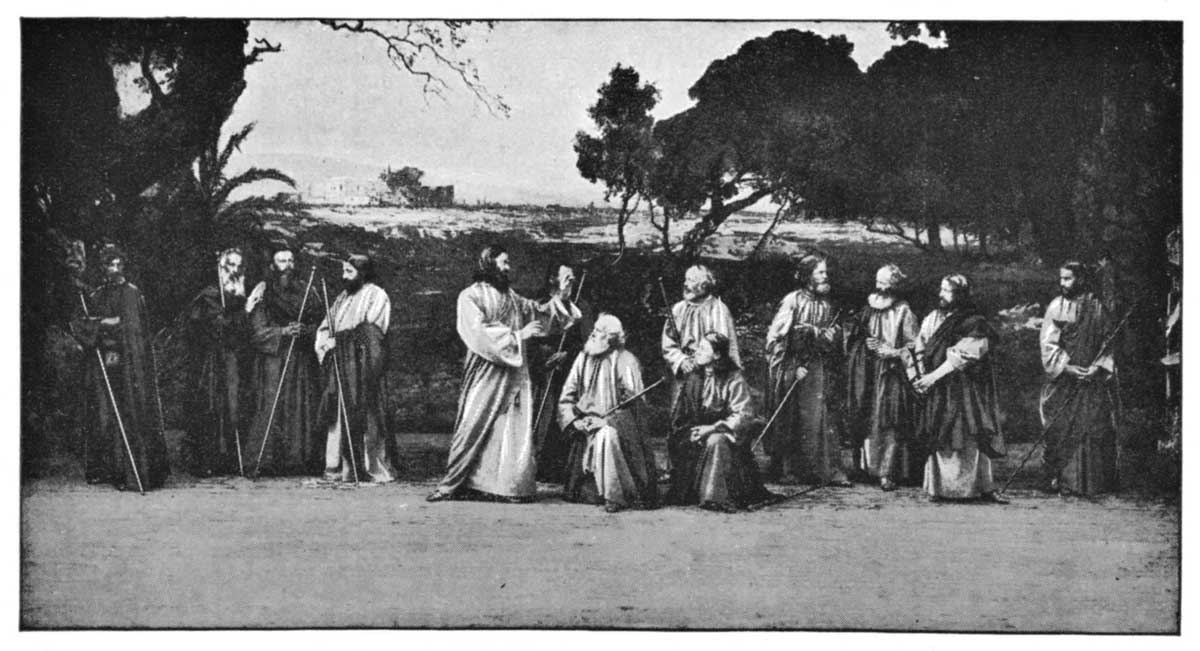Ploy Meets Girl
Hooking Up: Sex, Dating, and Relationships On Campus
by Kathleen A. Bogle
New York University Press, 2008
(240 pages, $17.95, paperback)
Unhooked: How Young Women Pursue Sex, Delay Love and Lose at Both
by Laura Sessions Stepp
Riverhead Books, 2008
(336 pages, $15.00, paperback)
Sex & the Soul: Juggling Sexuality, Spirituality, Romance, and Religion
on America’s College Campuses
by Donna Freitas
Oxford University Press, 2008
(328 pages, $24.95, hardcover)
reviewed by Nathaniel Peters
For much of the twentieth century, a guy and a girl interested in each other went out on dates. They got to know each other over time, entered into a relationship (marital or not), and then had sex. These days, they’re more likely to start with sex and then move to intimacy, unless they skip intimacy altogether. In other words, students are more likely to “hook up.” Half the students in one survey said that they started their evenings planning to have some form of sex, but with no particular person in mind.
Hooked Up
But what exactly do students mean by “hooking up”? Laura Sessions Stepp, a journalist for the Washington Post and author of Unhooked: How Young Women Pursue Sex, Delay Love and Lose at Both, decided to ask.
One student summed it up as “any possible amalgam of sexual behavior,” but Stepp elaborates on that: “Hooking up can consist entirely of one kiss, or it can involve fondling, oral sex, anal sex, intercourse or any combination of those things. It can happen only once with a partner, several times during a week or over many months.” The partners
may know each other well, only slightly or not at all, even after they have hooked up regularly. A hookup often happens in a bedroom, although other places will do: dance floors, bars, bathrooms, auditoriums or any deserted room on campus. It is frequently unplanned, though it need not be. It can mean the start of something, the end of something or the whole something. Feelings are discouraged, and both partners share an understanding that either of them can walk away at any time.
Note the vagueness of the term: Hooking up can mean anything from kissing to sexual intercourse. That vagueness allows students to do whatever they want to do and not talk about it directly unless they want to.
This kind of promiscuity shows a clear divorce between sexuality and relational intimacy, but it wasn’t always this way. In Hooking Up, LaSalle University sociologist Kathleen Bogle traces the evolution of the courtship process from the early twentieth century to the early twenty-first.
Back in the early 1900s, as we see in Frank Capra’s It’s a Wonderful Life, a young man came to a young woman’s house to call on her at her invitation, all under the watchful eye of her mother. But as poorer families in cities began to share homes, bringing a boy home to the scrutiny of both your family and your neighbors was less desirable. Other social changes came about with the arrival of the automobile and the cinema, and thus began the age of dating, which continued in various forms into the 1960s.
Encouraging Sex
With the sexual revolution and feminism, Bogle writes, sex acts outside of marriage became normal and encouraged. Women no longer needed a husband, for sex or for anything else.
Universities ceased to serve in loco parentis, and young men and women had more access to each other outside the classroom. On campus, women soon outnumbered men, who still called the shots on the sexual landscape but now were in greater demand.
As dating diminished, the social scene shifted from collections of couples to circles of friends. Add an increase in binge drinking and the stage was set for hooking up to replace dating as the “script” for students to follow in getting to know each other.
In the hookup culture, men enjoy a smorgasbord of sexuality, while women wish the situation were different. In their freshman year, both sexes are prone to running wild. But over time, many women discover that they want their sexual activity to express commitment. They soon learn that men are not as interested in commitment as they are, but even though commitment is the least likely outcome of hooking up, they keep hooking up because it’s the primary way to meet new men.
That’s the perception at least, and in a world without clear social norms, perceptions are all that students have for guidance. Bogle found that students often think their peers are more sexually adventurous—hooking up more frequently and with more partners—than they actually are. This thinking that “I’m not as bad as everyone else” provides a justification for pushing the limits, and soon the perception of increased sexual activity has become the reality.
After College
But what about after college? Do young people continue their dalliances in the working world? Bogle was the only author of the three reviewed here to interview alumni of the schools she visited, and she discovered that the answer is no.
Young adults continue to follow a social script, but after college that script focuses on traditional dating. A man is more likely to ask a woman for her number than he is to roll into bed with her that very night. Bogle writes: “After college, men seemed to interact with the opposite sex as one might expect their grandfathers would have done.”
Yet, as Stepp would note, many young women today would not know how to respond to even the most chivalrous man. After interviewing many women and some men in high school and at George Washington and Duke universities, she grew concerned with the disconnection between sexual activity and relational intimacy.
One student she interviewed talks about a girl who calls him just to have sex while they’re both single: “I could never have a conversation with her if I wanted to. . . . The next day I’ll see her on the street and it’s, ‘Hey, what’s goin’ on?’ And that’s it.” Another student told Stepp, “Sex is just something you should experience, like drugs.”
Though even the average secular adult would argue that sex should be about more than just the physical experience, colleges and their students focus only on sexual performance. Universities with no creedal convictions feel ill-equipped to help students address metaphysical questions like the meaning of sex. They can answer only the physical questions, and those end up being the only ones discussed.
At my freshman orientation at Swarthmore College five years ago, we were told about the Sexual Health Counselors, peers who advertised the ability to help with sex toys, contraception, or intriguing permutations of positions and partners. But the college offered no help to those who might ask deeper questions, or even to those who wondered what to do the next morning with the person beside them.
Sporting Love
Interestingly, Stepp argues, college sex education alone doesn’t explain the priority of performance over relationships. This priority is drilled into young people from their earliest days of school, when they are driven to succeed in academics and extracurriculars. The women she interviewed had been told all their lives that they should get what they want, and that real, committed love would only get in the way.
These women choose to achieve. They want to be in control, and they want to win. All their lives, they’ve won in the classroom, on the stage, and on the field, and they think that happiness will come from victory in the bedroom, too.
The women Stepp describes aren’t just letting themselves be played: Many of them are doing the playing. “At our age,” said one, “we’re supposed to be having fun. There are too many hot guys and not enough time. That’s what hooking up is all about.” Another told her: “Hooking up is saying, ‘I can have you whenever I want you and I can have whoever I want.’”
These women want to attract men, but can’t have real relationships because that would put their studies at risk, or worse yet, make them vulnerable. By hooking up, Stepp writes, they can control relationships the way they control their other activities.
But if love has become another sport to win, as one girl described it, you can’t have feelings for the competition. “Two of my friends are just friends and they hooked up,” one student told Stepp. “Really casual. Neither of them liked the other. That’s so common now. It’s nice for them because they don’t have to worry.”
What would they have to worry about? Stepp asked. “Oh, you know, getting feelings for each other. You’re drunk, or horny, the guy wants some, the girl wants some, and you won’t have to worry about hurt feelings.”
Soulless Sex
Stepp ascribes this desire for women to push aside their feelings and beat men at their own game to the predominant strains of feminism in the 1960s and 1970s, the ones that said that women should be free to use men the way men use women. Donna Freitas, assistant professor of religion at Boston University, does not want to see men used, but thinks that “the ongoing marginalization and trivialization of feminism by younger women and men” contributes to the unhealthy hookup culture on college campuses.
While she admires the way religion gives Evangelical students a way to understand their sexuality, she does not give a fully nuanced portrayal of the Evangelical chastity movement:
In on-campus battles for purity at evangelical colleges, sex becomes the enemy. Outside of marriage, sex is corrosive of a pure body and heart. Sex eats away at your relationship with God and your community. Moreover, the consequences of sex are irreversible. If you have sex outside of a marriage, you are, in a word, ruined.
Unfortunately, some Evangelicals do believe that those who have had extramarital sex are permanently “ruined.” But their excesses do not invalidate the healthier views of chastity that many more Evangelicals hold.
Freitas also mocks the advice to women to guard their hearts and bodies against the sexual predations of men. But in her own research—as in Bogle’s and Stepp’s—we see that many collegiate men do act like predators. Wisely pursuing chastity does not make a woman into the ward of domineering males.
Although Freitas’s personal bias colors some of her reporting, Sex and the Soul offers an honest portrayal of the collegiate religious climate. At most schools, students do not discuss religion. Most say that they are spiritual but not religious, by which they mean that they desire to find purpose or a foundation in their lives while eschewing the demands and commitments of organized religion.
Campus Religion
Many students who were brought up in a religion retain some of its ethics, but even they shed those ethics in their sexual lives. This “separation of religion and sex,” Freitas argues, results in “the inability of most religious affiliations to effectively empower youth to resist the sexual excesses of both college hookup culture and mainstream American popular culture.”
Her remedy for this separation and its consequences is to create an atmosphere on campus that is more conducive to the public discussion of religion, which is a good idea. She also wants colleges to help students find their own spirituality, and a middle ground between the Evangelical chastity culture and the modern hookup culture.
“To create a community where faith matters not just in theory but in reality, faith has to be a public value, not a private one,” she writes.
Professors need to embrace the idea of themselves as “spiritual guides” of a sort and their syllabi as “confessions of faith.” The campus should be a culture formed by a shared identity, mission, and values of its own, each forming a sense of itself as something special and set apart from the broader culture.
Unfortunately, this is not going to work. Part of the problem lies in the fact that modern universities have identity, mission, and values, but not the philosophy needed to justify them. Furthermore, professors should focus on teaching their disciplines, their primary purpose in a university, not on serving as spiritual directors.
“I’ve been thinking about how we don’t see sex as sacred anymore,” a friend told me at lunch during my senior year. It was the first time in my four years of college that I had heard a peer without a religious affiliation suggest that sex might mean something more than feelings. I suspect that she was not alone in her musings.
As Freitas notes, many students want something more but do not know where to turn. Without the serious moral reasoning of a longstanding philosophical or religious tradition, colleges cannot mend the gap between sex and the soul. And while a college’s restrictions on alcohol and promotion of alternative social events can help, real change in the collegiate sexual climate must come from the students themselves.
A More Excellent Way
Pastors and parents can offer help and guidance, especially in modeling and teaching what good, healthy relationships look like. They can also help students practice and articulate the beauty of the Christian sexual ethic on campus.
When a school has “Sex Week,” as our neighbor Haverford did this past year, groups can invite speakers like Christopher West to show how self-giving love and mutual dependence are far better than “friends with benefits.” Groups like Princeton’s Anscombe Society do exactly this kind of thing, proposing the truth through lectures and campus media, but also through social events that do not revolve around hooking up.
Having just graduated from college, I can testify that the behavior these authors describe and the concerns they raise are real. Kathleen Bogle, Laura Stepp, and Donna Freitas are right: Students are divorcing their sexuality from their religion, and from meaningful human interaction altogether. It is therefore up to Christian students to show their peers a more excellent way in their words and deeds, a way where love is no longer competitive or selfish, but truly free.
subscription options
Order
Print/Online Subscription

Get six issues (one year) of Touchstone PLUS full online access including pdf downloads for only $39.95. That's only $3.34 per month!
Order
Online Only
Subscription

Get a one-year full-access subscription to the Touchstone online archives for only $19.95. That's only $1.66 per month!
bulk subscriptions
Order Touchstone subscriptions in bulk and save $10 per sub! Each subscription includes 6 issues of Touchstone plus full online access to touchstonemag.com—including archives, videos, and pdf downloads of recent issues for only $29.95 each! Great for churches or study groups.
Transactions will be processed on a secure server.
more on sex from the online archives

28.3—May/June 2015
Of Bicycles, Sex, & Natural Law
Describing Human Ends & Our Limitations Is Neither Futile Nor Unloving by R. V. Young
more from the online archives
calling all readers
Please Donate
"There are magazines worth reading but few worth saving . . . Touchstone is just such a magazine."
—Alice von Hildebrand
"Here we do not concede one square millimeter of territory to falsehood, folly, contemporary sentimentality, or fashion. We speak the truth, and let God be our judge. . . . Touchstone is the one committedly Christian conservative journal."
—Anthony Esolen, Touchstone senior editor











